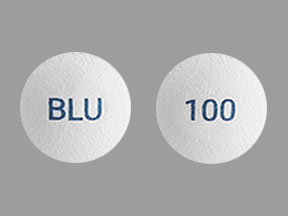Ayvakit Dosage
Generic name: avapritinib 100mg
Dosage form: tablet, film coated
Drug class: Multikinase inhibitors
Medically reviewed by Drugs.com. Last updated on May 24, 2023.
Recommended Administration
Administer AYVAKIT orally on an empty stomach, at least 1 hour before or 2 hours after a meal [see Clinical Pharmacology (12.3)].
Do not make up for a missed dose within 8 hours of the next scheduled dose.
Do not repeat dose if vomiting occurs after AYVAKIT but continue with the next scheduled dose.
GIST Harboring PDGFRA Exon 18 Mutations
Select patients for treatment with AYVAKIT based on the presence of a PDGFRA exon 18 mutation [see Clinical Studies (14.1)]. An FDA-approved test for the detection of exon 18 mutations is not currently available.
The recommended dosage of AYVAKIT is 300 mg orally once daily in patients with GIST. Continue treatment until disease progression or unacceptable toxicity.
Advanced Systemic Mastocytosis
The recommended dosage of AYVAKIT is 200 mg orally once daily in patients with AdvSM. Continue treatment until disease progression or unacceptable toxicity.
Indolent Systemic Mastocytosis
The recommended dosage of AYVAKIT is 25 mg orally once daily in patients with ISM.
Dosage Modifications for Adverse Reactions
The recommended dosage reductions and modifications for adverse reactions are provided in Tables 1 and 2.
| Dose Reduction Level | Dosage in patients with GIST* | Dosage in patients with AdvSM† |
|---|---|---|
| First dose reduction | 200 mg once daily | 100 mg once daily |
| Second dose reduction | 100 mg once daily | 50 mg once daily |
| Third dose reduction | - | 25 mg once daily |
| Adverse Reaction | Severity* | Dosage Modification |
|---|---|---|
|
||
| Patients with GIST or AdvSM | ||
| Intracranial Hemorrhage [see Warnings and Precautions (5.1)] | Any grade | Permanently discontinue AYVAKIT. |
| Cognitive Effects [see Warnings and Precautions (5.2)] | Grade 1 | Continue AYVAKIT at same dose or reduced dose or withhold until improvement to baseline or resolution. Resume at same dose or reduced dose. |
| Grade 2 or Grade 3 | Withhold AYVAKIT until improvement to baseline, Grade 1, or resolution. Resume at same dose or reduced dose. | |
| Grade 4 | Permanently discontinue AYVAKIT. | |
| Other [see Adverse Reactions (6.1)] | Grade 3 or Grade 4 | Withhold AYVAKIT until improvement to less than or equal to Grade 2. Resume at same dose or reduced dose, as clinically appropriate. |
| Patients with AdvSM | ||
| Thrombocytopenia [see Warnings and Precautions (5.1)] | <50 × 109/L | Interrupt AYVAKIT until platelet count is ≥ 50 × 109/L, then resume at reduced dose (per Table 1). If platelet counts do not recover above 50 × 109/L, consider platelet support. |
Concomitant Use of Strong and Moderate CYP3A Inhibitors
Avoid concomitant use of AYVAKIT with strong or moderate CYP3A inhibitors. If concomitant use with a moderate CYP3A inhibitor cannot be avoided, the starting dosage of AYVAKIT is as follows [see Drug Interactions (7.1)]:
- GIST: 100 mg orally once daily
- AdvSM: 50 mg orally once daily
For ISM, avoid concomitant use of AYVAKIT with strong or moderate CYP3A inhibitors.
Dosage Modifications for Severe Hepatic Impairment
A modified starting dosage of AYVAKIT is recommended for patients with severe hepatic impairment (Child-Pugh Class C) [see Use in Specific Populations (8.7)]:
- GIST: 200 mg orally once daily
- AdvSM: 100 mg orally once daily
- ISM: 25 mg orally every other day
More about Ayvakit (avapritinib)
- Check interactions
- Compare alternatives
- Pricing & coupons
- Reviews (1)
- Drug images
- Side effects
- During pregnancy
- FDA approval history
- Drug class: multikinase inhibitors
- Breastfeeding
- En español
Patient resources
Professional resources
Related treatment guides
Further information
Always consult your healthcare provider to ensure the information displayed on this page applies to your personal circumstances.

